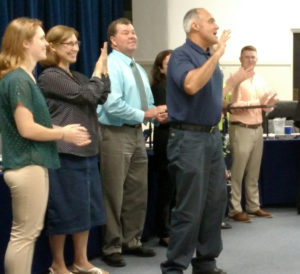School Board addresses recent controversy
By Ruthann Carr, Correspondent
At Wednesday’s (Sept. 12) School Board meeting there was enough to keep anyone interested.
Teachers praised Chair Perrie Johnson during public comment.
The Board commended those involved in keeping students safe in the opening day bus fire.
Starting June 30, 2019, teachers will be offered tenure two years sooner.
The Board settled the school lunch debt debate.
Parents and teachers raised concerns about student testing.
Public comment periods often go by without anyone speaking.
Wednesday was different, in large part in response to a motion offered by Shirley Stewart (Rivanna) at the August Board meeting.
Stewart took issue with how Johnson greeted school staff at a breakfast Aug. 2.
In her remarks, Johnson said, in part: “I worked with Fluvanna for 25 years as a teacher and I quit. Then I got on the School Board to try and change some of the things that made me want to quit. Which brings me to – you are my heroes.”
In response, Stewart proposed the following motion:
“I would like to make the following motion that we inform staff that the message from the chair on opening day was not spoken on behalf of the board. Therefore, the board directs the superintendent to draft a statement that represents the mission, beliefs and strategic priorities that have previously been approved by the board to be shared with staff.”
At Wednesday’s meeting Stewart withdrew that motion, but not before the public got their say.
Several teachers spoke affirming their respect for Johnson.
“There were a lot of comments [about Johnson’s remarks to the teachers] and I’m baffled by that so I wanted to come by and thank Mrs. Johnson for her opening day remarks,” said Jennifer Flood. “I thought the comments were very nice… I was thanked, called a hero and heard Mrs. Johnson’s reasons for wanting to be on the board which I thought was perfectly appropriate.”
Robert Flood echoed his wife’s comments and thanked Johnson for her service and commitment to students.
“Thank you for all the work you’ve done to help change this board around.”
Jessica Jackson, a pre-kindergarten teacher, said she wrote an editorial to the Fluvanna Review about the controversy and emailed a copy to each School Board member.
She said she found “nothing out of the ordinary” in Johnson’s opening day remarks.
“It takes courage to say what things are good and there are things than need to change,” she said. “I really hope the School Board doesn’t vote to have Mr. Winkler send to the teachers a letter restating the mission, beliefs and strategic priorities…it would be a waste of time, a waste of paper and money and would be a covert way to try to reprimand Mrs. Johnson.”
Jackson said she could “feel the tension” among board members and urged them to take time to build relationships with each other.
“Take the high road,” she said.
Stewart withdrawing her motion did not end the discussion.
Brenda Pace (Palmyra) said she has “great respect” for Johnson, but “I had people come to me concerned” about Johnson’s remarks.
“What if I’m a new employee hearing that?” Pace said. “I just felt it wasn’t the proper setting.”
Pace said the board has to “revisit the governing rules, policies and procedures” on when a board member is speaking for themselves and when they are speaking for the board.
Stewart said she meant her motion to “open dialogue,” not to be a “personal criticism” of Johnson.
Andrew Pullen (Columbia) read an email he said he received from Board of Supervisor Chair Mike Sheridan in which Sheridan referred to Johnson as the “true definition of a public servant.”
During the second round of public comments Jackson spoke again.
“I’m still a bit bothered,” Jackson said. “The motion was withdrawn but then it was ‘but, but, but.’ When you put a ‘but’ to it, it kind of negates – it doesn’t feel genuine to me. It bothers me. It still feels like a reprimand… When people speak the truth there shouldn’t be a reprimand.”
Also during the second round of public comments, Angela Davis, a parent and teacher, attempted to answer Pace’s question on how a new employee would take Johnson’s remarks.
“A new teacher is going to say, ‘What’s going on?’ Then they’ll turn to their mentor and their mentor is going to fill them in on everything that’s been going on in the past 10, 15, 20 years and then they’re going to say, ‘But you’re here at a really good time because we have board members who are working hard for us.’”
See below to read Davis’ comments to the board about testing.
Bus fire
 Also, during the first round of public comments, Mark Schmidt, of Bluebird Bus Sales of Virginia, said, “Aug. 9 will be forever branded” in his mind because of the bus that caught on fire.
Also, during the first round of public comments, Mark Schmidt, of Bluebird Bus Sales of Virginia, said, “Aug. 9 will be forever branded” in his mind because of the bus that caught on fire.
He praised the bus driver, Terry Carter, and all the others who helped get the 34 children on the bus to safety.
Schmidt said the incident spurred him to start the National School Bus Safety Foundation.
“Everyone will know it started in Fluvanna,” he said, adding there “is a brand new replacement bus at our Petersburg facility ready to go – at no cost.”
Winkler and the board recognized the following for helping get the students off the bus before the fire worsened:
Terry Carter;
Henry Woodfolk;
Jason Black;
Chad Harrison;
Catherine Grey;
Marsha Stanford;
The Fluvanna Fire Department and first responders; and
The school bus garage workers and the transportation department.
Upon receiving his commendation, Carter said: “They say it takes a village to raise a child. Well, it takes a community to protect our kids. I’m not a hero. We didn’t have time to think, all we could do was save our babies.”
Tenure
The board voted to change the amount of time a new teacher has to work before being offered a “continuing contract,” or tenure. It had been five years.
The Board voted 4-1 to change it to three years. Stewart voted against the change.
During discussion before the vote, Stewart said, “I’d have a hard time supporting three years and letting people go and they continue to grow.”
Lunch debt
On the matter of school lunch debt, the board voted unanimously to make changes to the school meals policy. In part, those changes include:
Prohibiting students from purchasing any extra items once the account has a balance of $0 or less;
Emailing notices to parents/guardians weekly if the account balance is $5 or less, when there is a valid email on file; and
When a household has reached a threshold of $250, legal collection procedures may be initiated. All other efforts to collect delinquent or bad debt will be handled by food services, administration, and guidance together.
To review the policy changes go to https://sites.google.com/a/apps.fluco.org/school-board-policies/j and click “students,” then “meals and snacks.”
Here is the full text of what teacher and parent Angela Davis said about testing to
the School Board at Wednesday’s (Sept. 12) meeting.
My name is Angela Davis and I live in the Cunningham District. I’m here tonight to talk to you about the over-testing of our children.
Teachers are being driven to teach to the test, but certainly not call it that. Everything they do is geared toward helping these students pass that SOL test in May. Everything from the homework to the weekly skills checks they give all need to show the kind of rigor that these kids will face in May. Administrators will say it’s so the students will have the best chance possible at passing these tests. Teachers tell themselves that it’s so the students won’t be stressed out come test time because they’ll know what to expect. The reality is that these kids are already being stressed out with all the test preparations. I have seen this firsthand and will now comment on this as a parent of a fourth grader.
My daughter has always loved school. Ever since she was in preschool she would cry if she couldn’t go to school. This all changed, however, when she entered second grade. I was very confused at the change in my child as she suddenly didn’t care if she went to school or not and would often times ask to stay home. As a teacher, I knew all of the questions to ask. (At least I thought I did.) The answers she gave told me that she loved her teacher, had friends in the class, wasn’t being picked on, didn’t feel the work was too difficult or too easy. So I was at a loss. When I went to speak with her teacher during conferences, however, it became crystal clear. When she pulled out the long list of assessments and scores that my 7-year-old had already participated in (during the first two months of school) I was floored! And remember, I’m a third grade teacher! And I was still floored. No wonder she was done with school. It was now less about learning something interesting and more about passing tests.
Fast forward to her third-grade year when [my daughter] Abby sat reading a book in my classroom after school one day. Her teacher stopped by and said, “Hey Abby! Don’t forget that you have a multiplication test tomorrow.” We watched as my daughter completely crumpled in the chair. To say we were surprised would be an understatement. After all, this was a child who was a wiz at multiplication. When questioned about her response, Abby said, “Tests. All we ever do is take tests.” At this point it was her teacher and I who crumpled. Because we knew. We knew she was right and there wasn’t anything we could do about it.
But you as a board can do something about this. I urge you to look at all of the assessments we give these children every year and figure out what we can get rid of. Notice I said get rid of and not replace with another type of test. I feel like sometimes that’s what we do. Do your own research. Don’t just depend on information from those whose jobs are directly linked to what assessments we give. Find out for yourselves what is truly mandated and what isn’t. And talk to the teachers. Teachers are on the front lines every day. We’ll tell you what we feel is beneficial to our instruction and what isn’t. Our scores were good last year. Some would say great. They may tell you it’s because of all the data we were able to get from all the testing we did last year. My daughter would tell you that it’s not. She would say that our scores were good despite all the testing. After all, by the time she took her MAP reading test in the spring, her score dropped 10 points from the fall. She was done. And I can’t blame her.




